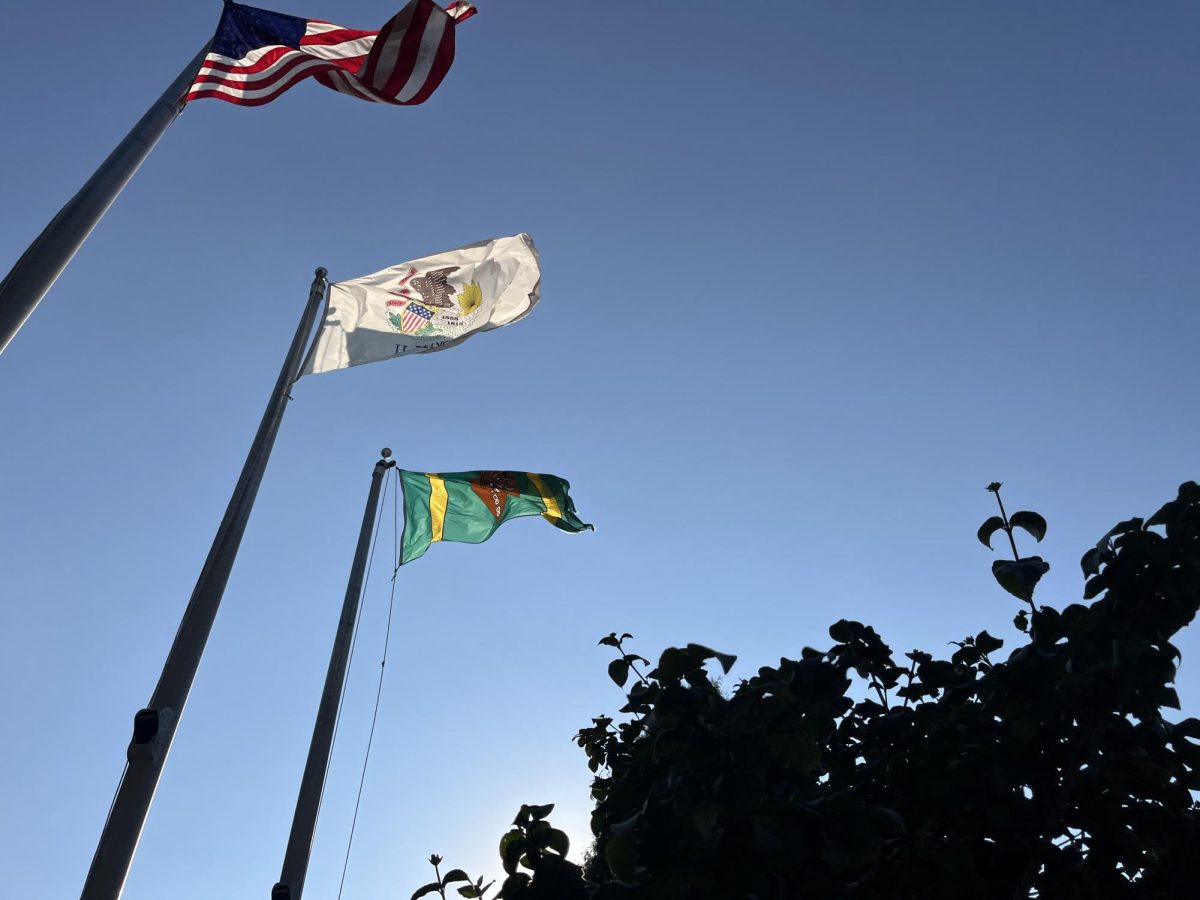“Hold everything!”
I said those words at the age of eight, on the old stage of my elementary school. It was a tradition for East Prairie third-graders to perform a musical retelling of Chicago’s history, and in spite of my dreading having to sing onstage, it was going well. I was about to join in a tale of Ms. O’Leary’s cow, a rendition of the Blues Brothers’ “Sweet Home Chicago,” and a Frank Sinatra send-up of “Chicago (That Toddlin’ Town).” I had learned how to square-dance, had traced the Native origin of the city’s name, had gotten to wear sunglasses. It would certainly seem that Chicago was something to be happy about.
The same went for all of Illinois, a state I was proud to come from. And I’m still proud, proud that we were the first state to recognize the 13th Amendment, the first to ban cash bail, the first to recognize Martin Luther King Jr. Day, and the first to prohibit the banning of books. The progressive way I was raised to think and the state in which I live are synonymous in my mind.
This is the irony of Illinois. We’ve made it perfectly possible to learn accurate history–and then encouraged people to do so…and still, this state has not told the full truth about itself.
By the time Jean Baptise Point DuSable had put down roots in the land that became Chicago, slavery had been legal for years, brought to the region by French settlers in the 1700’s (sources disagree on an exact year.) Nine years after his arrival, in 1787, the Northwest Ordinance would make it illegal–but didn’t end it: enslavers would use a system akin to indentured servitude, in which Black people would sign contracts (under duress, according to historian Darrel Dexter) to provide unpaid labor to white people for years–as many 99 of them.
Even unenslaved Black residents of Illinois had a far from easy life. Just a year after being admitted as a state–and a “free” one, devoid of slavery, at that–Illinois’ General Assembly passed “An Act Respecting Negroes, Mulattoes, Servants and Slaves,” which prevented Black people from living free unless they could produce documents showing they were unenslaved, and they had to register with the government of whatever municipality they wanted to reside in. Those who went without documents would be branded fugitives from slavery–and forced into it. Over years of revisions to their “Black Laws,” Illinois made it illegal for more than two Black people to join together at the same place, or for any Black person to give legal testimony if a White person was on the stand. The underlying hope was that Black people would be dissuaded from coming to Illinois at all–to the point that, in 1853, the legislature made it a crime for Black people to travel to Illinois and remain there for longer than ten days. The website of Illinois’ own Office of the Secretary of State conjectures that “perhaps no state had stricter or more discriminatory Black Laws than Illinois.”
Why didn’t I learn a shred of this in history class?
The Illinois State Board of Education’s standards for social studies make minimal mention of history belonging to the state itself. In fourth grade, students “explain probable causes and effects of events and developments in Illinois history”; meanwhile, Illinois’ mandated units of study include “a unit of instruction studying the events of Black history.” Beyond this, no state requirements exist to focus the study of history on anti-Blackness in Illinois–or on Illinois, period.
According to Kate Masur, a Professor of History at Northwestern University, this is in part because of a “marginalization of all forms” of history or social studies in public school curriculums. Reading and math, she says, are given preference, having a greater presence on standardized tests. When history is taught, “local history always takes a backseat to what could be considered national history,” Masur said, because there’s just not enough time to go deeper.
AP US History teacher Pankaj Sharma saw further obstacles. “Depending on the teacher, where they’re from, or where they trained or studied, they may not have the background in the history there [of the state where they teach] to make them feel comfortable doing it,” Sharma said. He noted the consequences that this could have for students, especially those in Illinois: “They might not see how complicated it was–the civil rights struggle, the abolition struggle; it’s not just north versus south, or good versus evil. There’s lots of different complexities, even within states that had abolished slavery, but still had a history of Black Codes, segregation or discrimination, and racial violence.”
Masur concurred, noting that when the history of Black people in Illinois is told, it’s often begun with the Great Migration. She and a team of students and staff at Northwestern created a freely accessible website on the early history of African Americans in Illinois. “Ideally,” she said, “People would have the opportunity to learn some of both” state and national history. Knowing the story of the place they live, the professor explained, could make the past feel more relatable for students: “Sometimes local history just works better.”
Danielle Clapper, a former third-grade teacher at East Prairie Elementary School and one of those who helped lead kids in the musical project, saw still further benefits to teaching specific state history–including unsavory parts. “Getting kids to think critically about the impact of events in our society, whether positive or unjust, should be a focus in social studies,” Clapper said. “Asking open-ended questions and guiding students to examine multiple sources and perspectives is crucial.”
In short, Illinois’ government needs to do what it does best: embrace helpful policy. The State Board of Education needs to create a mandate for a class–an entire class–on Illinois history, and to generate certification programs to allow teachers to take up that mantle. From the beginning, that class needs to note the history of racism in our neck of the woods–of which anti-Blackness is just one part: consider the displacement of Native people from this area, for example. Nor should this racism be treated as dead and gone: Chicago, our most famous city, is more racially segregated than any in the country, with a history of torture tactics being used by the CPD.
One of the hallmarks of the kind of progressive behavior I’ve learned over the years is telling the truth about the past. When injustice has been done in a certain place, the people who make that place home should know about it. Illinois cannot afford to be founded on irony–on encouraging people to find out the truth, without actually telling it to them. Our progressive spot in the country will be complete only when we can put our worst moments on display, unafraid, to be learned from.















